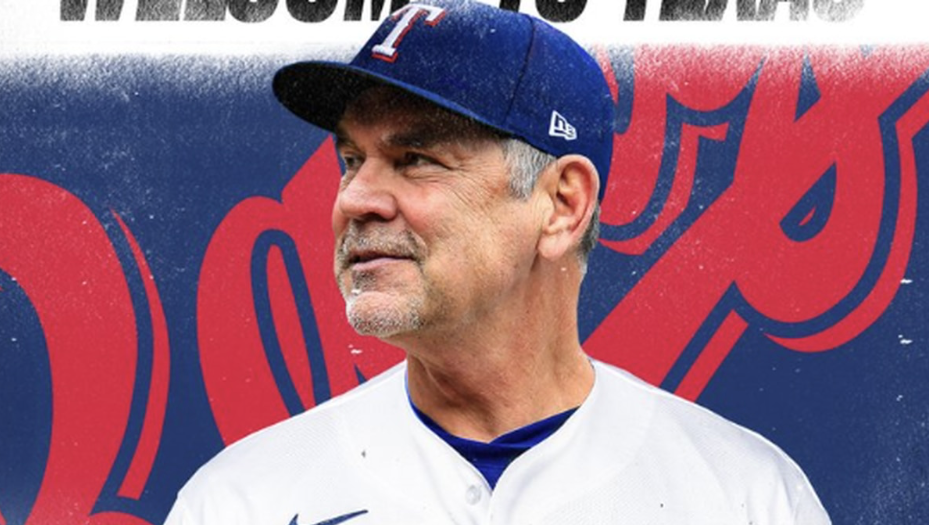 What Texas Rangers’ Manager Bruce Bochy Thinks Of Parents Who Play “Daddy Ball”
What Texas Rangers’ Manager Bruce Bochy Thinks Of Parents Who Play “Daddy Ball”
(By guest contributor Mindi Bach)
What Texas Rangers’ Manager Bruce Bochy Thinks Of Parents Who Play “Daddy Ball.” The garage door slammed, and my nine-year-old son came bouncing into the house, dirt-stained and sweaty from his baseball game.
“Mom, I caught today.”
“Great!” I replied with excitement and a little bit of incredulity. He mostly played in the outfield with this team.
“Yeah, I asked the coach if I could play catcher, and he said if we got a really big lead, he’d put me in.”
I shot my husband a quizzical look. He had just entered the kitchen with an armful of sunflower seed packets and water bottles left in the car after a week’s worth of games.
“Did the coach really say that?” I mouthed silently to him. He nodded that he did indeed.
“Christopher hit a double that made it 15 to one,” our son continued, “and I got to catch the last inning.” My husband nodded again.
“Well, I’m sure you did great,” I told him. “And you know the score doesn’t mean anything about your ability to catch.”
“I know,” he shrugged. “’ You-know-who’ was playing catcher today,” he said matter-of-factly, and off he ran to find ways to get even dirtier.
I had just returned from our oldest son’s baseball game, so I wasn’t absolutely sure what took place, but my husband quickly confirmed my suspicion. It’s a situation we understand all too well. “You-know-who” is the coach’s son, and on this particular team, the coach plays “Daddyball.”
Why Year-Round Baseball Is A Really Bad Idea For Kids
Parents may not be familiar with the term, but they certainly know the practice. I have yet to meet a parent with kids in youth sports who has not experienced some degree of Daddyball. It can take place in any sport – soccer, flag football, basketball – but hands down; the situation is most problematic in baseball.
Daddy ball is when the coach only plays his son at the coveted positions of catcher, pitcher, and shortstop. It entails batting him leadoff, third, or clean-up, rarely putting him on the bench, and giving him priority to return to those positions no matter how many practices or games he has missed. Typically, assistant coaches with sons on the team are given similar perks.
As a mom of three boys, I’ve sat through more youth baseball games than I care to remember, outwardly supportive while my insides twist as I watch Daddy ball coaches trying to turn their kids into the next Brandon Crawford or Buster Posey at the expense of their teammates. It’s not only frustrating as a parent but as a journalist who covers professional sports. I’ve seen Rangers’ manager Bruce Bochy give his struggling professional players more opportunity in high-pressure playoff situations than some youth coaches give eight-, nine- and 10-year-olds in a run-of-the-mill Tuesday night game. I always wondered what Bruce would say to these parents if he saw how they managed their teams around their sons. I finally stopped wondering and asked him.
“The best advice I think I can give is to make them feel like they’re one of the guys on the team,” Bochy explained. “Try to keep from singling them out or try to give them any extra or special time than you would the other guys. I know it’s easier said than done because he’s your son.”
Bochy’s reason for avoiding favoritism among a roster with many Major League All-Stars applies just the same to parents who are coaching a bunch of hyper youngsters still figuring out the game’s fundamentals. Playing favorites doesn’t build a team. It divides it. That holds true even if the coach’s child is indeed the most skilled player on the team.
“They may deserve to be there, but still, I think there’s a way you can make a conscious effort to make them be part of the club,” Bochy said. “I think the other players will appreciate that, and the parents especially.”
I once thought my small Bay Area town was unique when it comes to Daddyball. Three World Championships in the last six years has this area of baseball crazed. My neighbors have dogs named Willie, Buster, Cody, and Hunter. Our kids play on the same Little League fields where Barry Bonds started launching balls out of the park. Yes, our small town loves baseball. But in talking with out-of-town friends or in comments I’ve received through social media, I now know Daddy Ball is a common occurrence everywhere.
“It’s really terrible, and I think a lot of it is that parents take it too seriously too fast,” says Randy Vogt. Vogt coached his sons, Danny and Stephen, from the moment they swung a plastic preschool bat all the way through high school. He considers the six years he got up at 3 a.m. to head to work so he could be home for 3 p.m. practices the best time of his life. Stephen Vogt is a retired All-Star catcher for the Oakland Athletics. He credits his dad for teaching him how to play the game the right way – master the fundamentals and put the team first. But Randy has noticed a shift in the attitude of many of the parents who are in Stephen’s generation.
“They don’t believe that the coach or the teacher is in a position of authority, so a lot of these guys start coaching because they want to control what happens to their kid,” the older Vogt said.
“You may be there because your son is on a team and no one else is willing to coach, or you wanted to make sure that your son didn’t get a raw deal, but once you’re there and once you’re coaching, you’re coaching a team. You’re not coaching your son. You can coach your son at home. You can give him another hour or two in the cage at home or after practice or whatever, but when you’re there with 12 kids, every one of those 12 kids is your kid.”
It’s similar to how Stu Pederson approached coaching his sons, Giants’ All-Star center fielder Joc Pederson and his older brother Tyger, who spent time in the Dodgers’ minor league system.
“When I was on the field, I didn’t treat them like they were my boys, my own kids. They were just part of the team. So whatever was best for the team,” Pederson said.
Pederson had a cup of coffee with the Dodgers himself and has since coached baseball, basketball, and football at the youth, high school, and collegiate levels. He believes many youth coaches today equate winning with being a good coach. For Pederson, the score is irrelevant.
“When people start putting too much pressure on the results rather than the process, then that’s where our society gets screwed up,” Pederson said. “My number one concern is to make sure the kids have fun. If they’re not having fun, then they’re not going to enjoy it. They’re not going to work at it.”
“As they play more, hopefully, they’ll get a little better, and they’ll start understanding what they’re supposed to do,” Pederson added, “and the kids have fun by being successful.”
There are many parents who coach their own kids without practicing Daddy ball. Some even go out of their way to avoid favoring their own kids and will turn to them in tough situations. Bochy understands that, too. He still gets choked up when talking about managing his own son, Brett, a right-handed reliever.
In September 2014, Bochy became the first manager in Major League history to hand the ball to his son on the mound. It was Brett’s Major League debut.
“It was an emotional moment that I’ll never forget,” Bochy remembered. “A nervous moment to go with that, though. I don’t get nervous during games, but I was nervous. I was really nervous for him.”
The Giants were playing their biggest rival, the Los Angeles Dodgers, and the situation wasn’t ideal. The bases were loaded when Brett got the signal from his dad.
“Of course, my wife barked at me when I got home. She said, ‘You couldn’t find a better spot to put him in?’” Bochy laughed. “I know Brett’s a tough kid; he can handle it.”
“There wasn’t a bigger moment in baseball for me than that moment,” Bochy said, pausing to reflect. “This game’s been going on over 100 years, so for us to make history …. I compare it to the World Series.”
As parents in youth sports, our “World Series” moment should be when our kids leave the field with huge smiles on their faces and can’t wait to play again. I am grateful to the parents who volunteer their time and rearrange their schedules in order to coach. Most people wouldn’t go to such lengths if they couldn’t coach their own kids. I appreciate the team parents who help with field prep, organize snack schedules, run the snack shack, snap pictures, drive carpool, fundraise, set up team parties, and take up the collection for coaches’ gifts. Running a youth team is a group effort. All of our kids deserve the same opportunity to learn and play. They will come to understand how to compete and earn positions soon enough.
“When baseball is no longer fun, it’s no longer a game.” That’s what Joe DiMaggio once said. As summer winds down and the Little League World Series comes to a close, his words are worth remembering for whatever youth sport comes next.
Mini Bach is an Emmy award-winning anchor/reporter for Comcast SportsNet Bay Area and the mother of three boys. Follow her on Twitter @MBachCSN or Facebook MBachCSN












